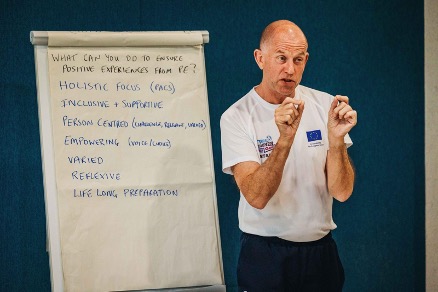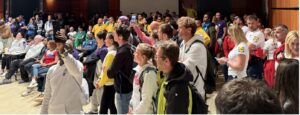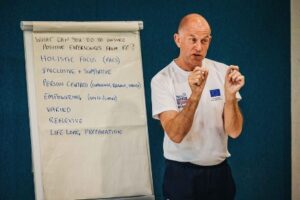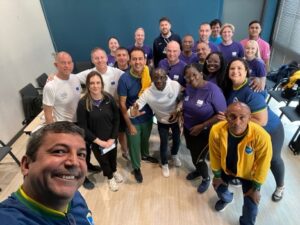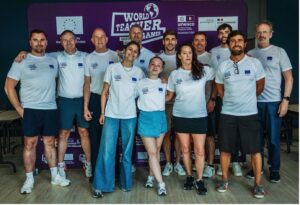By Nigel Green, Chair of IPLA
Introduction
The World Teacher Games was initiated and run by the International Sports Federation (ISF), who invited PE teachers from all over the world to attend the inaugural teacher games. 250 teachers from 25 countries such as Brazil, Oman, India, Angola, took part in a two-day workshop followed by two days of sport competition and a final conference.
Main Highlights
Nigel Green was invited to run the physical literacy sessions as he is part of the PE Specialist ISF group. The delegates had the choice of a range of sessions including AI in PE, Trauma Informed PE, Early Years PE and seven other sessions, which were scheduled over the two-day period. Nigel ran six sessions where the delegates were encouraged to reflect on their own physical activity engagement throughout life, to consider how their engagement had developed and changed, and what had influenced this. The delegates were then asked to reflect on the experiences of a child they had taught or coached and how their work had impacted on the child from a physical, affective, cognitive and social perspective. Finally, the delegates were asked to consider what they could do in the future to ensure a holistic focus on children’s development through PE. How they could be more inclusive, supportive, child centred, provide voice and choice, provide a wide variety of experiences, encourage reflexivity and be lifelong activity focused.
All the tasks were discussion based with partner and idea sharing. The personal responses provided rich examples from each aspect. Although the language issues were a challenge, the teachers were creative with translation between countries, and the cooperation was fabulous.
After the two days of workshops, the teachers took part in a touch rugby beach tournament and a volleyball tournament on day three followed by a badminton, swimming and running competition on day 4. These were country specific and mixed country competitions, which everyone enjoyed. An evening or pétanque (French Boules) and cultural dancing, was a highlight, as well as the food provided throughout the week.
On the final day the teachers took part in a conference before traveling back home.
Lessons Learned
It was quite apparent the most teachers had a limited understanding about physical literacy, particularly with regards to the holistic nature of the concept, but also in relation to how PE can impact on each individual physical literacy journey and lifelong engagement in physical activity. Work needs to be done worldwide to ensure teachers of PE understand PL.
Teachers, and the facilitators love to be active and play sports. The facilitators enjoyed playing pickleball most nights, and the pétanque provided a great friendly cultural competition between countries. The touch rugby event was a challenge for most as it was on sand and not many knew how to play the game, but it was enjoyable, as was the volleyball.
The delegates really enjoyed the physical literacy sessions. Some notable quotes after the session were:
Belgium PE teacher with 20 years’ experience – ‘We have physical literacy in Belgium, but it is not like this and the way you have explained it has revolutionised my thinking about PE. I am going to change my practices when I return home’.
Spanish Maths teacher – ‘This concept is fantastic and should be applied to all subjects, however, we would also need to change the way we assess progress as well as the current system does not recognise holistic growth’.
Young Cyprus teacher – ‘We have a lot of older teachers teaching PE in Cyprus and they are very set in their ways. You need to come to Cyprus, and we need to get all the PE teachers into the same room to learn about physical literacy’.
Next Steps
Discussions with the ISF will take place, to consider how PL can be shared with a wider group of PE teachers through their work. The way in which practical and theory sessions were integrated provided a very positive and multi-cultural event, which could certainly form a basis of a format for engaging teachers in understanding PL in the future.

